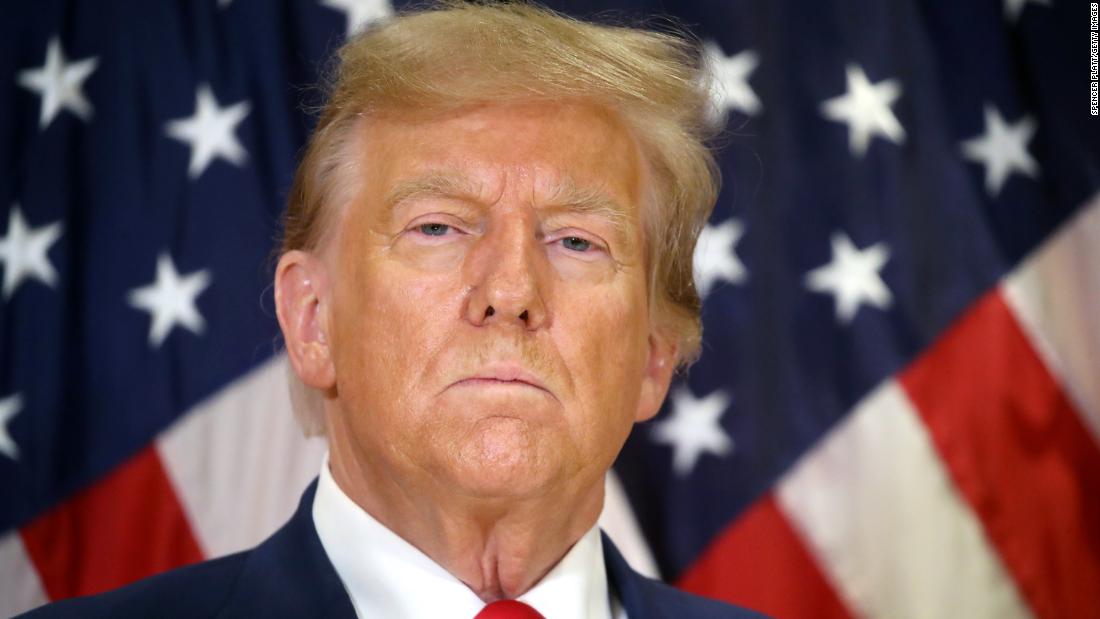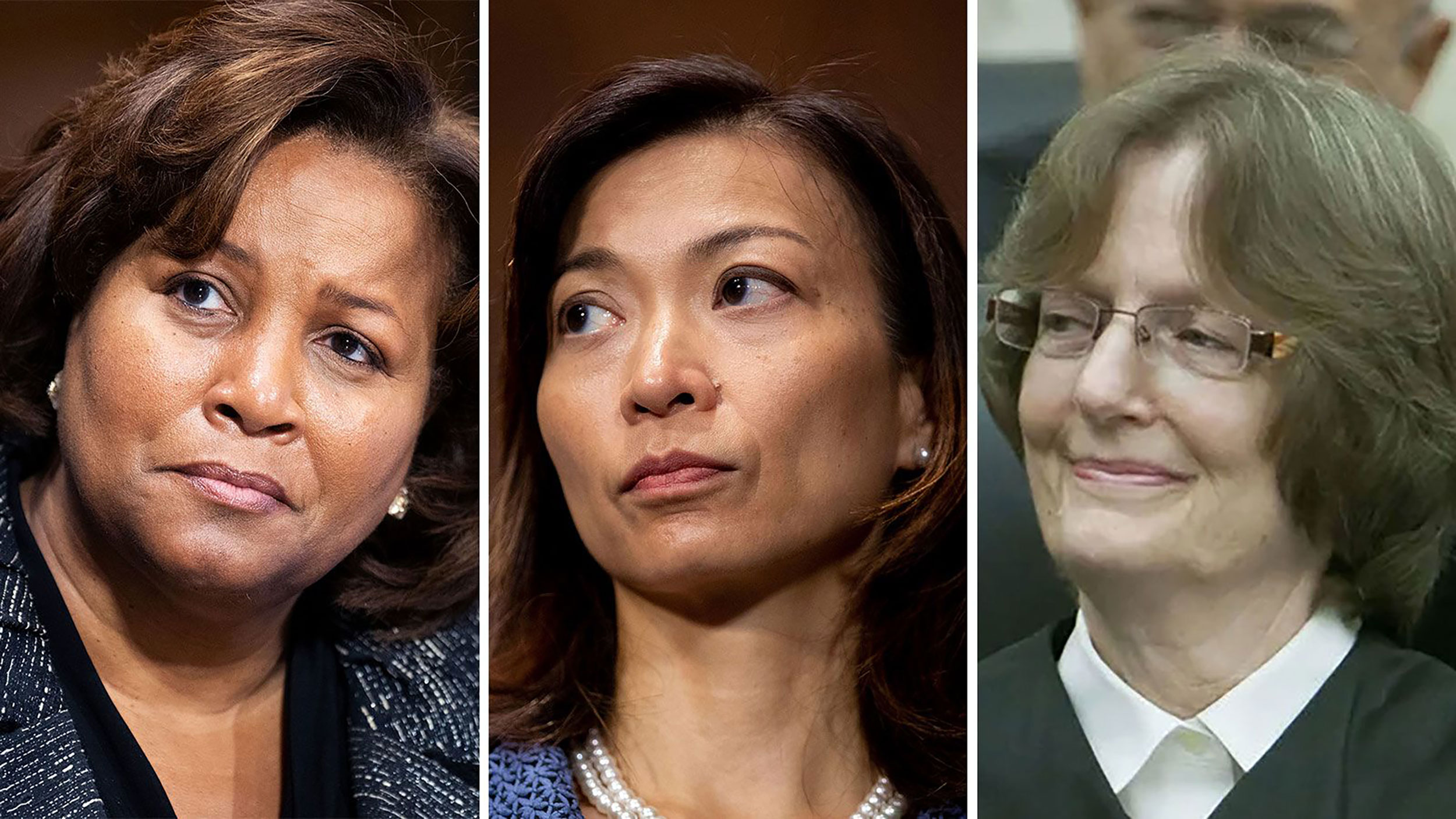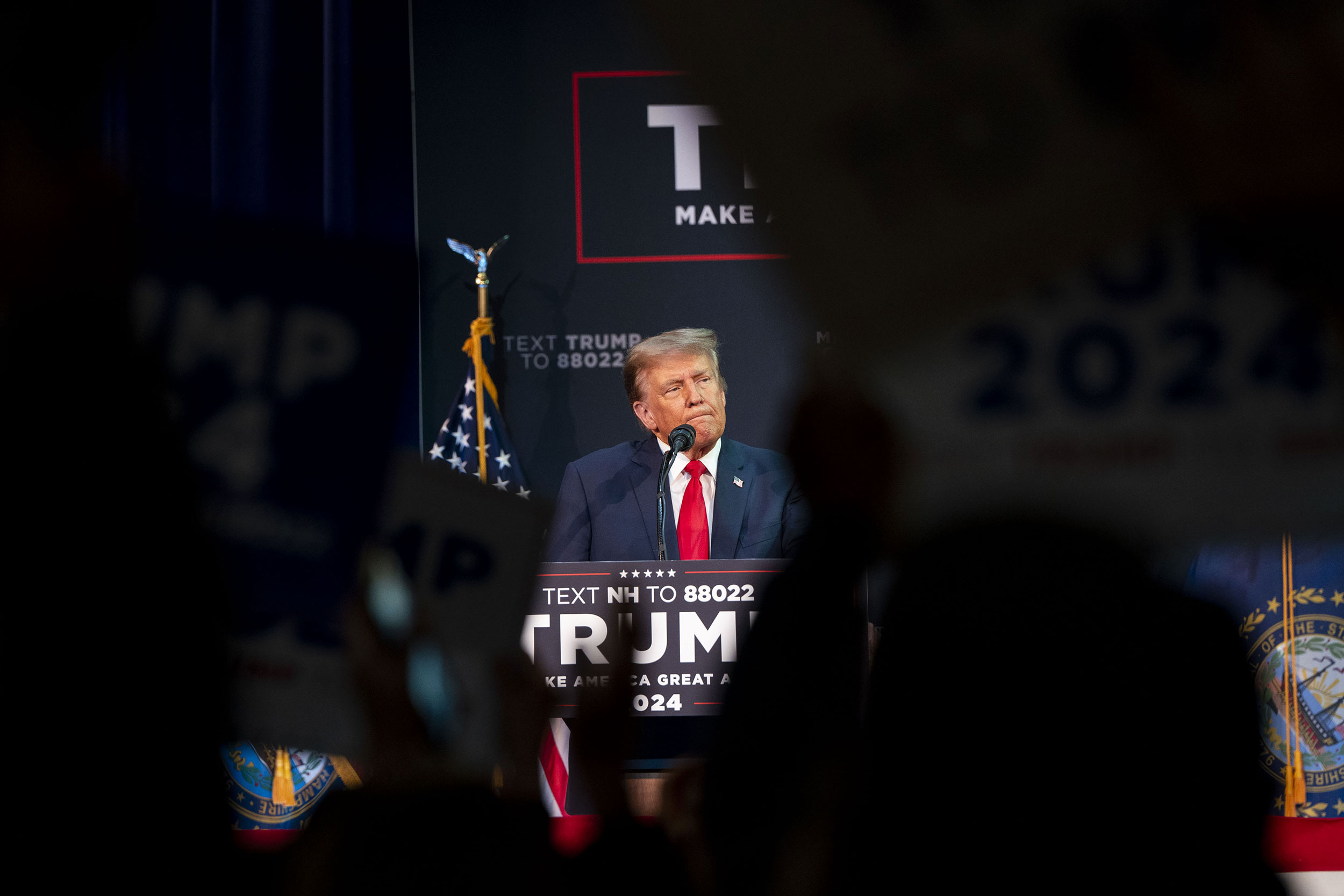Donald Trump is not immune from prosecution for alleged crimes he committed during his presidency to reverse the 2020 election results, a federal appeals court said Tuesday.
The ruling from the three-judge panel was unanimous.



Donald Trump is not immune from prosecution for alleged crimes he committed during his presidency to reverse the 2020 election results, a federal appeals court said Tuesday.
The ruling from the three-judge panel was unanimous.
From CNN's Devan Cole, Hannah Rabinowitz, Katelyn Polantz and Marshall Cohen
In the opinion finding that Donald Trump is not immune from prosecution, the three appeals court judges found that if proven, the former president’s efforts to usurp the 2020 presidential election were an "unprecedented assault on the structure of our government."
“It would be a striking paradox if the President, who alone is vested with the constitutional duty to ‘take Care that the Laws be faithfully executed,’ were the sole officer capable of defying those laws with impunity,” they wrote.
The judges flatly rejected Trump’s claim that his criminal indictment would have a “chilling effect” on future presidents.
“Moreover, past Presidents have understood themselves to be subject to impeachment and criminal liability, at least under certain circumstances, so the possibility of chilling executive action is already in effect,” they wrote.
Trump’s attorneys had argued that if future chief executives believed that they could be indicted for their “official acts” as president, they would be more hesitant to act within their role.
"We cannot accept that the office of the Presidency places its former occupants above the law for all time thereafter. Careful evaluation of these concerns leads us to conclude that there is no functional justification for immunizing former Presidents from federal prosecution in general or for immunizing former President Trump from the specific charges in the Indictment," the appeals court judges also said.
In rejecting Trump’s immunity arguments, the appeals panel also said the public interest in holding a potentially criminal president accountable outweighed the potential negative impacts on the office of the presidency.
But the court was clear to explicitly note that they weren’t offering any commentary on the potential implications of prosecuting a sitting president – which didn’t happen in this case.
From CNN's Devan Cole, Hannah Rabinowitz and Katelyn Polantz
Donald Trump is not immune from prosecution for alleged crimes he committed during his presidency to reverse the 2020 election results, a federal appeals court said Tuesday.
Trump faces four counts from special counsel Jack Smith's election subversion charges, including conspiring to defraud the United States and to obstruct an official proceeding. The former president has pleaded not guilty.
Trump has argued that he was working to “ensure election integrity” as part of his official capacity as president, and therefore he is immune from criminal prosecution for trying to overturn the election results. His lawyers have also asserted that because Trump was acquitted by the Senate during impeachment proceedings, he is protected by double jeopardy and cannot be charged by the Justice Department for the same conduct.
So what happens now? The immunity question is ultimately expected to end up before the Supreme Court, one of several consequential cases the high court will take up related to Trump this year.
From CNN's Devan Cole, Hannah Rabinowitz and Katelyn Polantz

The three-judge appeals court panel that issued the ruling Tuesday includes two judges, J. Michelle Childs and Florence Pan, who were appointed by Joe Biden and one, Karen LeCraft Henderson, who was appointed by George H.W. Bush.
In their unanimous opinion, the appeals court found that former President Donald Trump is not protected from criminal prosecution under the separation of powers clause.
“Here, former President Trump’s actions allegedly violated generally applicable criminal laws, meaning those acts were not properly within the scope of his lawful discretion,” they wrote, meaning that existing case law “provide him no structural immunity from the charges in the Indictment.”
They continued: “Properly understood, the separation of powers doctrine may immunize lawful discretionary acts but does not bar the federal criminal prosecution of a former President for every official act.”
The three appeals court judges said that Trump asked them to find “for the first time that a former President is categorically immune from federal criminal prosecution for any act conceivably within the outer perimeter of his executive responsibility,” they wrote.
From CNN's Devan Cole and Hannah Rabinowitz

Donald Trump is not immune from prosecution for alleged crimes he committed during his presidency to reverse the 2020 election results, a federal appeals court said Tuesday.
The ruling is a major blow to Trump’s key defense thus far in the federal election subversion case brought against him by special counsel Jack Smith. The former president had argued that the conduct Smith charged him over was part of his official duties as president and therefore shield him from criminal liability.
“For the purpose of this criminal case, former President Trump has become citizen Trump, with all of the defenses of any other criminal defendant. But any executive immunity that may have protected him while he served as President no longer protects him against this prosecution,” the court wrote.
Trump’s team could appeal the ruling directly to the Supreme Court, or first ask for en banc review at the appeals court, meaning the case would be heard again, but this time by the full DC Circuit.
From CNN's Devan Cole and Hannah Rabinowitz
A federal appeals court has issued a ruling on Donald Trump’s claims of absolute presidential immunity from prosecution for alleged crimes he committed while in office.
CNN is reviewing the decision from the DC Circuit Court of Appeals.
From CNN's Jeremy Herb, Marshall Cohen and Devan Cole
A federal appeals panel expressed deep skepticism early January toward Donald Trump’s argument that he can’t be prosecuted for trying to overturn the 2020 election, raising the potentially extreme implications of absolute presidential immunity.
Trump’s lawyers argued that his federal election subversion indictment should be dismissed because he is immune from prosecution. But the three judges on the US Court of Appeals for the District of Columbia Circuit panel questioned whether this immunity theory championed by Trump’s lawyers would allow presidents to sell pardons or even assassinate political opponents.
Special counsel Jack Smith’s team argued that a president is not above the law, warning that allowing presidential immunity from prosecution would open a “floodgate” and saying that it would be “awfully scary” if there were no criminal mechanism to stop future president’s from usurping the vote and remaining in power.
Still, the judges also wondered if they even have jurisdiction to decide the question of presidential immunity at this point in the case. Trump is scheduled to go on trial in March for his role in trying to overturn the 2020 election. He has pleaded not guilty.
Trump chose to attend the hearing – a reminder of the role that his four criminal indictments are playing in his presidential campaign.
The appeals court ruling is likely to set up a showdown over presidential immunity at the Supreme Court.
Here are the key takeaways from the oral arguments.
Donald Trump is not immune from prosecution for alleged crimes he committed during his presidency to reverse the 2020 election results, a federal appeals court said Tuesday.
The ruling from the three-judge panel was unanimous.
In the opinion finding that Donald Trump is not immune from prosecution, the three appeals court judges found that if proven, the former president’s efforts to usurp the 2020 presidential election were an "unprecedented assault on the structure of our government."
“It would be a striking paradox if the President, who alone is vested with the constitutional duty to ‘take Care that the Laws be faithfully executed,’ were the sole officer capable of defying those laws with impunity,” they wrote.
The judges flatly rejected Trump’s claim that his criminal indictment would have a “chilling effect” on future presidents.
“Moreover, past Presidents have understood themselves to be subject to impeachment and criminal liability, at least under certain circumstances, so the possibility of chilling executive action is already in effect,” they wrote.
Trump’s attorneys had argued that if future chief executives believed that they could be indicted for their “official acts” as president, they would be more hesitant to act within their role.
"We cannot accept that the office of the Presidency places its former occupants above the law for all time thereafter. Careful evaluation of these concerns leads us to conclude that there is no functional justification for immunizing former Presidents from federal prosecution in general or for immunizing former President Trump from the specific charges in the Indictment," the appeals court judges also said.
In rejecting Trump’s immunity arguments, the appeals panel also said the public interest in holding a potentially criminal president accountable outweighed the potential negative impacts on the office of the presidency.
But the court was clear to explicitly note that they weren’t offering any commentary on the potential implications of prosecuting a sitting president – which didn’t happen in this case.
Donald Trump is not immune from prosecution for alleged crimes he committed during his presidency to reverse the 2020 election results, a federal appeals court said Tuesday.
Trump faces four counts from special counsel Jack Smith's election subversion charges, including conspiring to defraud the United States and to obstruct an official proceeding. The former president has pleaded not guilty.
Trump has argued that he was working to “ensure election integrity” as part of his official capacity as president, and therefore he is immune from criminal prosecution for trying to overturn the election results. His lawyers have also asserted that because Trump was acquitted by the Senate during impeachment proceedings, he is protected by double jeopardy and cannot be charged by the Justice Department for the same conduct.
So what happens now? The immunity question is ultimately expected to end up before the Supreme Court, one of several consequential cases the high court will take up related to Trump this year.

The three-judge appeals court panel that issued the ruling Tuesday includes two judges, J. Michelle Childs and Florence Pan, who were appointed by Joe Biden and one, Karen LeCraft Henderson, who was appointed by George H.W. Bush.
In their unanimous opinion, the appeals court found that former President Donald Trump is not protected from criminal prosecution under the separation of powers clause.
“Here, former President Trump’s actions allegedly violated generally applicable criminal laws, meaning those acts were not properly within the scope of his lawful discretion,” they wrote, meaning that existing case law “provide him no structural immunity from the charges in the Indictment.”
They continued: “Properly understood, the separation of powers doctrine may immunize lawful discretionary acts but does not bar the federal criminal prosecution of a former President for every official act.”
The three appeals court judges said that Trump asked them to find “for the first time that a former President is categorically immune from federal criminal prosecution for any act conceivably within the outer perimeter of his executive responsibility,” they wrote.

Donald Trump is not immune from prosecution for alleged crimes he committed during his presidency to reverse the 2020 election results, a federal appeals court said Tuesday.
The ruling is a major blow to Trump’s key defense thus far in the federal election subversion case brought against him by special counsel Jack Smith. The former president had argued that the conduct Smith charged him over was part of his official duties as president and therefore shield him from criminal liability.
“For the purpose of this criminal case, former President Trump has become citizen Trump, with all of the defenses of any other criminal defendant. But any executive immunity that may have protected him while he served as President no longer protects him against this prosecution,” the court wrote.
Trump’s team could appeal the ruling directly to the Supreme Court, or first ask for en banc review at the appeals court, meaning the case would be heard again, but this time by the full DC Circuit.
A federal appeals court has issued a ruling on Donald Trump’s claims of absolute presidential immunity from prosecution for alleged crimes he committed while in office.
CNN is reviewing the decision from the DC Circuit Court of Appeals.
A federal appeals panel expressed deep skepticism early January toward Donald Trump’s argument that he can’t be prosecuted for trying to overturn the 2020 election, raising the potentially extreme implications of absolute presidential immunity.
Trump’s lawyers argued that his federal election subversion indictment should be dismissed because he is immune from prosecution. But the three judges on the US Court of Appeals for the District of Columbia Circuit panel questioned whether this immunity theory championed by Trump’s lawyers would allow presidents to sell pardons or even assassinate political opponents.
Special counsel Jack Smith’s team argued that a president is not above the law, warning that allowing presidential immunity from prosecution would open a “floodgate” and saying that it would be “awfully scary” if there were no criminal mechanism to stop future president’s from usurping the vote and remaining in power.
Still, the judges also wondered if they even have jurisdiction to decide the question of presidential immunity at this point in the case. Trump is scheduled to go on trial in March for his role in trying to overturn the 2020 election. He has pleaded not guilty.
Trump chose to attend the hearing – a reminder of the role that his four criminal indictments are playing in his presidential campaign.
The appeals court ruling is likely to set up a showdown over presidential immunity at the Supreme Court.
Here are the key takeaways from the oral arguments.